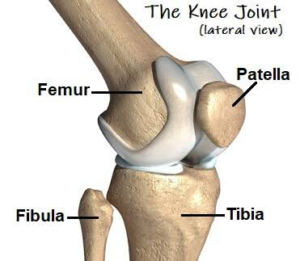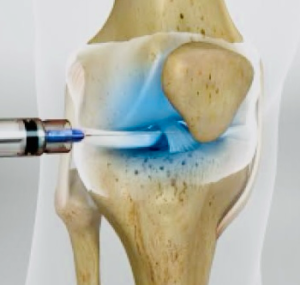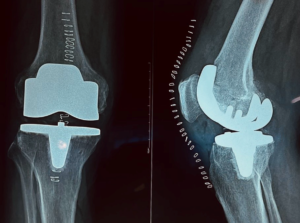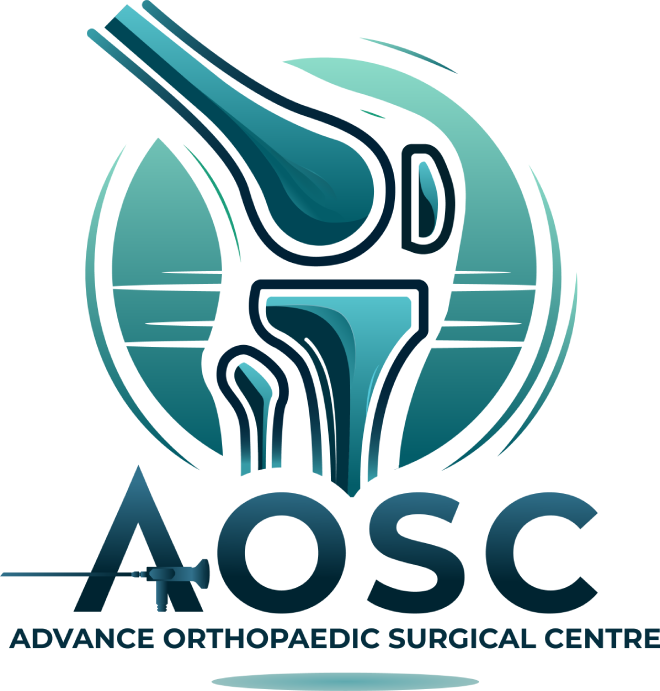UNDERSTANDING THE KNEE JOINT
The knee is the largest joint in the body, made up of the femur (thigh bone), tibia (shin bone), and patella (kneecap). It also has cartilage, ligaments, tendons, and the synovial membrane, which help in movement and stability. Meniscus cartilage acts as a shock absorber, reducing impact on the joint

Non-Surgical Treatment Options
Before considering surgery, Dr. Nitin Rawal and his team at AOSC focus on non-surgical treatments such as:
✅ Painkillers & anti-inflammatory medications to relieve discomfort.
✅ Walking aids like canes or walkers for support.
✅ Physiotherapy to strengthen the knee and improve movement.
✅ Viscosupplementation (joint lubrication injections) to reduce friction.
✅ Steroid injections if other treatments do not work.

If these treatments fail to relieve pain and restore function, Total Knee Replacement (TKR) is considered.
Why is TKR Needed?
The most common reasons for knee replacement are:
- Osteoarthritis – Wear and tear of knee cartilage, common in people over 50.
- Post-Traumatic Arthritis – Arthritis due to a past injury, fracture, or ligament tear.
- Rheumatoid Arthritis – An autoimmune condition that causes inflammation and damages the knee joint.
When is Surgery the Best Option?
Surgery is recommended when:
✅ Pain, stiffness, and swelling cannot be managed with medications or therapy.
✅ The knee becomes deformed or unstable.
✅ Daily activities like walking or climbing stairs become difficult.
Before Surgery – Medical Evaluation
Before the procedure, Dr. Nitin Rawal and his expert team conduct a thorough check-up, including:
✅ Medical history review (past illnesses, injuries, medications).
✅ Physical examination to check knee movement and swelling.
✅ X-rays & MRI to assess the damage.
✅ Blood, urine, and dental check-ups to rule out infections before surgery.
Surgical Procedure
The patient is admitted on the day of surgery. Dr. Nitin Rawal and his team at AOSC perform the procedure in well-equipped hospitals.
✅ The patient is given anesthesia (spinal or general).
✅ The damaged knee surface is removed and replaced with a prosthetic joint (metal & plastic implants).
✅ The procedure takes about 2 hours and is followed by monitoring in the recovery room.

Post-Surgery Care & Recovery
✅ Medications to control pain and prevent blood clots.
✅ Physiotherapy starts early to regain movement.
✅ Wound care – Keeping the incision dry and clean.
✅ Balanced diet – Rich in iron to support healing.
✅ Gradual increase in physical activity – Walking, standing, and climbing stairs within 3-6 weeks under a physiotherapist’s guidance.
✅ Driving resumes in about 4 weeks.
Why Choose Dr. Nitin Rawal & Team at AOSC for TKR?
⭐ Expertise in knee replacement surgery with advanced techniques.
⭐ Personalized care & 24×7 support for second opinions or queries.
If you or a loved one is struggling with severe knee pain and mobility issues, Dr. Nitin Rawal and his team at AOSCare here to help. Contact us today for expert guidance and the best knee replacement
